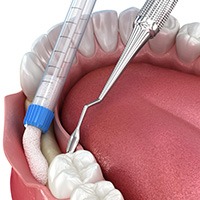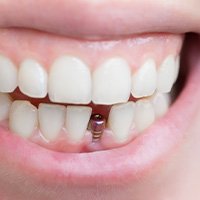Dental Implants — Carlisle, PA
Enjoy a Complete Smile After Tooth Loss
 Whether it’s just one tooth or several, the loss of a fully natural smile can have devastating consequences for patients. Not only does oral health suffer, but your self-confidence and enthusiasm can be dealt a blow as well making it hard to look in the mirror. Thankfully, our team of accomplished doctors at Flenniken Family Dentistry is proud to offer the ideal solution for many patients – dental implants. Implants transform your smile for the better providing you with the valuable health and aesthetic benefits you’ve been missing. If you’re interested in undergoing an implant consultation, contact our Carlisle office today!
Whether it’s just one tooth or several, the loss of a fully natural smile can have devastating consequences for patients. Not only does oral health suffer, but your self-confidence and enthusiasm can be dealt a blow as well making it hard to look in the mirror. Thankfully, our team of accomplished doctors at Flenniken Family Dentistry is proud to offer the ideal solution for many patients – dental implants. Implants transform your smile for the better providing you with the valuable health and aesthetic benefits you’ve been missing. If you’re interested in undergoing an implant consultation, contact our Carlisle office today!
Why Choose Flenniken Family Dentistry for Dental Implants?
- Start-to-Finish Convenience
- Calming Dental Sedation Offered
- Flexible Financing Available
What Are Dental Implants?

Unlike dental bridges and dentures, dental implants are surgically inserted into the jawbone. They’re an incredibly popular tooth replacement option because they replace the entire structure of missing teeth, from the roots up to the chewing surface. Over time, the implant will naturally fuse with the surrounding bone tissue, creating a foundation strong enough to support any number of replacement teeth. When you’re all healed up, your dental implants will function and look just like natural teeth. You’ll be able to eat, speak, and smile with the same ease as you did before tooth loss!
The 4-Step Dental Implant Process
One of the benefits of coming to Flenniken Family Dentistry is that we offer this procedure and all the other steps of the dental implant process in-office. Other dentists refer patients to outside specialists. We hope this makes treatment more streamlined and comfortable for you, as you’ll be seen by the same team from start-to-finish. While each dental implant procedure can vary based on individual needs, they all have four main steps, which we’ve taken the time to outline below.
Initial Dental Implant Consultation

We start every dental implant treatment out with an in-depth consultation and evaluation of your dental and medical health. This will help us determine whether you’re a good candidate for the treatment as well as establish some basic details, like whether you’ll require any preparatory procedures before your implant surgery.
During your consultation, our team will also walk you through your treatment plan so you know what to expect, answer any questions you may have, and provide you with a detailed cost estimate. That way, once you have all of the information you need, you can make an informed decision on whether you want to move forward with the process.
Dental Implant Surgery

Our skilled team of dentists at Flenniken Family Dentistry are able to complete the entire process in-house, including your dental implant placement. To access the jawbone, a small window will be made in the gumline to secure the implant. We’ll ensure you’re numb and comfortable during your procedure and secure a protective cap over your implant once it’s in your mouth.
Osseointegration & Abutment Placement

After your surgery, you’ll undergo a process called osseointegration, which is when your implants will fuse with your jawbone. This will take place over the following three to six months. Once your gums have healed and the implants are integrated with your bone, we’ll have you come back in to attach small metal connector pieces to the tops of your implants, called abutments, as well as capture digital impressions of your mouth that we’ll use to fit and create your dental restorations.
Attaching the Final Restorations

Once your final restorations arrive at our office from our dental laboratory, we’ll have you come back in to secure them to your implants and complete your smile. Our team will provide you with detailed post-operative instructions as well as a rundown of what you can expect as you’re adjusting to your new teeth. If you have any questions or concerns following this visit, please don’t hesitate to call us.
Benefits of Dental Implants

Today, dental implants happen to be the most popular tooth replacements. They’re so well-liked that U.S. dentists place roughly 500,000 of them yearly! That said, this reaction is natural – implants have a unique restoration method. Unlike dentures and bridges, they’re set in your tooth sockets and gradually fuse with your jawbone. That means they offer perks that other restorations can’t match! To learn more, just keep reading or call our office for details.
Day-to-Day Benefits

Typically, implants’ everyday benefits are the ones that stand out most. These typically include:
- Lifelike Results – Implants are capped with dental crowns, so they look beautiful and blend seamlessly with your smile. Your friends and family won’t even know you have a prosthetic!
- Greater Confidence – Since they fill the gaps in your smile, implants tend to boost patient confidence. This effect leads to less anxiety and greater comfort in social situations.
- Better Eating – By fusing with your jaw, implants actually restore much of your bite force. Consequently, they’ll help you chew all kinds of tough foods.
- Easy Maintenance – Compared to dentures or dental bridges, implants don’t require special upkeep. You can clean them as you would your natural teeth. In other words, just remember to brush them twice daily and floss them once daily.
Health Benefits

Aside from the day-to-day upsides, you may notice implants’ various health benefits. Some examples of these are:
- Improved Nutrition – By letting you eat a wider variety of foods, implants help you get crucial vitamins and minerals. The result is a major improvement in your nutritional health.
- Smile Support – If you don’t address them, smile gaps will cause your surrounding teeth to tilt and fall out. Thankfully, implants fill those spaces and thus secure your pearly whites.
- No Tooth Sensitivity – Because they’re set directly in jaw sockets, implants don’t rub against other teeth or gum tissue. They don’t irritate your mouth like dentures or bridges might.
Long-term Benefits

Of course, what really distinguishes implants are their long-term advantages. The most common of these are the following:
- High Success Rate – So long as they’re well-placed, implants seldom fail early. Their long-term success rate even stands above 95%!
- Long-Lasting Results – The average implant has a lifespan of 15-20 years. Meanwhile, a properly maintained one can last for 30 years or more. In either case, an implant could potentially help you for a lifetime.
- Big Savings – When they’re looked after well, implants save you money. They require fewer repair visits than dentures or dental bridges. As such, you’ll get to keep the money that’d otherwise go to keeping your restorations intact.
Who Dental Implants Can Help

Good oral health and sufficient jawbone density are the most important factors when determining whether a patient is right or not for dental implants. Additional procedures may be required to correct these concerns before we agree to place new implants. Above all else, we ask that prospective candidates commit to attending regular check-ups and cleanings here in the Carlisle area.
Understanding the Cost of Dental Implants

Dental implants are the best tooth replacement option out there. They replace the roots of the missing teeth, allowing for utmost stability, comfort, and longevity. However, many patients worry about the cost of their treatment. During your appointment with us, we will discuss the cost of your treatment in detail so that you don’t run into any surprises. Until then, here are some things for you to take into account.
Preliminary Treatments & Dental Implant Surgery

Sometimes, patients need preliminary treatment before they can get dental implants. This includes things like gum disease treatment, tooth extractions, bone grafting, sinus lifts, and other services. It’s important to consider the cost of these procedures if they apply to you. Fortunately, the cost of preliminary procedures often receives partial coverage by dental insurance. Just keep in mind that every plan is a little bit different, so it is best to contact your procedure ahead of time to confirm your coverage.
The Parts of Your Dental Implant

There are many factors that contribute to the cost of getting dental implants. Here are the ones that play the most significant role:
- Number of Dental Implants: The number of teeth that you are missing and their locations in their mouth determine the number of dental implants you need. The more dental implants you get, the higher the cost will be.
- Restoration Type: Dental crowns, bridges, and dentures all have different costs. Generally speaking, the smaller the restoration, the lower the cost.
- Materials Used: Dental implants are generally made from surgical titanium. However, they can also be made from zirconia in some circumstances.
- Implant Brand: Just like other products, dental implants come from numerous manufacturers. This influences the cost.
How Dental Implants Can Save You Money

It is tempting to try to save money by choosing a more affordable tooth replacement – like dentures. Dentures are great for some people, but they don’t provide the same long-lasting benefits that dental implants do. Dental implants can actually end up saving you money in the long run. This is because you don’t have to worry about spending money on frequent repairs and replacements. You also don’t have to buy adhesives and soaking solutions to maintain implants. Dental implants prevent serious oral health issues, helping you to avoid costly restorative treatments in the future.
Does My Dental Insurance Cover Dental Implants

Dental insurance doesn’t usually cover the cost of dental implant surgery. However, it sometimes partially covers necessary preliminary procedures and final restorations. Everyone’s plan is different, so it is best to confirm this with your provider ahead of time. If you have any questions or concerns regarding your benefits, feel free to reach out to one of our friendly team members.
Making Dental Implants Affordable

If you don’t have dental insurance, this doesn’t mean that you will be left completely on your own. Currently, we have a special offer for $300 off single dental implants. We are also happy to accept payments through CareCredit – a third-party financing company that can split the cost of your treatment into manageable monthly installments with little to no interest. If you want to learn more or need help applying, don’t hesitate to contact us.
Maintaining & Caring for Your Dental Implants

Dental implants are a long-term investment in your smile, but like natural teeth, they need proper care to stay strong and healthy. By protecting your implants, you can ensure they last a lifetime and continue serving your smile well! At Flenniken Family Dentistry, we want your restorations to look and feel their best for many years to come. So, read more below to see how to care for your implants and keep your smile in top shape!
Make Oral Hygiene a Priority

Even though dental implants can't really get cavities, your gums and surrounding teeth still need cleaning and maintenance. This is because plaque buildup can still threaten the stability of your smile due to gum disease. To keep your smile healthy:
- Brush twice daily with a soft-bristled toothbrush.
- Use fluoride toothpaste with the ADA seal of acceptance.
- Floss daily with implant-safe floss or a water flosser.
- Rinse with an alcohol-free antibacterial mouthwash.
Eat a Healthy Diet

As the adage goes, “You are what you eat.” and this is even more true for your pearly whites! A balanced diet helps keep your gums and overall oral health strong. So, consider these dietary tips:
- Eat plenty of fruits, vegetables, and lean proteins to support gum health.
- Avoid excessive sugar and acidic foods that can contribute to bacteria buildup.
- Drink plenty of water to keep your mouth hydrated and rinse away food particles.
- Limit hard or sticky foods that could put unnecessary stress on your implants.
Break Bad Habits

Certain habits can damage your restorations and lead to complications if left untreated. To protect your smile, try to avoid:
- Smoking, vaping, or tobacco use, which slows healing and increases the risk of implant failure.
- Chewing on hard objects like ice, pens, or fingernails that can put excessive pressure on your implants.
- Using your teeth as tools for opening packages or biting your nails.
- Grinding or clenching your teeth, which can cause excessive force on your implants.
If you struggle with any of these habits, let us know! We can modify your treatment plan and help you find resources and solutions to protect your investment.
Protect Your Dental Implants

There’s no doubt that dental implants are strong, but they still need some measure of protection to prevent damage. Here are a few ways to keep them safe:
- Wear a nightguard if you grind your teeth at night.
- Use a mouthguard if you play contact sports, even if it’s not top-of-the-line, something is better than nothing!
- Avoid biting down on hard foods like popcorn kernels or hard candy.
- Be gentle when flossing around your implants. Don’t snap the string or pull it against the implant too hard.
Schedule Regular Dental Checkups

Bi-annual dental visits are vital for keeping your dental implants and gums in top condition. Besides good home care, it’s the most important aspect of your implant maintenance strategy. So, visit us regularly for:
- Professional cleanings to remove plaque and tartar buildup.
- A thorough exam to check your implants and surrounding tissues.
- X-rays if needed to monitor bone health and implant stability.
- Personalized advice on caring for your implants long-term.
Dental Implants Post-Op Instructions

Once we’ve placed your dental implants, we’ll provide you with a list of post-op instructions. Following the steps we give you is essential if you want to enjoy a smooth recovery process while keeping your discomfort under control. Below is a brief look at some of the instructions that we give our dental implant patients. Remember, you can always reach out to us if you have any questions or concerns while your mouth is healing.
What to Do Directly After Dental Implant Surgery

After the surgery, a blood clot will appear at the implant site. To ensure that your mouth is able to heal properly, you need to leave the blood clot undisturbed. You should therefore avoid touching the area with your tongue or fingers, and you shouldn’t smoke or use a straw. It’s also important to refrain from spitting; if there’s any excess saliva in your mouth that you need to get rid of, either swallow it or use a tissue.
Common Side Effects When Recovering from Dental Implant Placement

After your dental implants have been placed, you may experience some intermittent bleeding. You can control it by putting pressure on the area with a piece of gauze. Some swelling may also occur, but you can typically reduce it with a cold or warm compress. There may be discomfort as well; if so, taking over-the-counter medication such as ibuprofen can help. If any of your symptoms last longer than expected or seem to grow worse, give us a call.
Your Diet After Dental Implant Surgery

It’s necessary to avoid hard or crunchy foods while your mouth is recovering from dental implant placement. Plan on eating softer options that require less or no chewing, including mashed potatoes, pasta, scrambled eggs, yogurt, and pudding. You can also enjoy a nice bowl of soup, but make sure it isn’t too hot.
Your mouth will eventually recover to the point where you can return to a normal diet, but you’ll still want to avoid directly chewing on your implant site.
Post-Op Health & Oral Hygiene

To prevent an infection from occurring during the recovery process, you need to practice good oral hygiene. You can continue brushing like normal as early as the day after your surgery, but you will need to be very gentle around the area where the dental implants were placed. Also, you may find it helpful to rinse with salt water after each meal. If you use mouthwash, make sure that it doesn’t contain any alcohol.
What to Do After Your New Teeth Are Attached

After your mouth has fully recovered from dental implant surgery, we’ll be ready to place a crown, bridge, or denture. This shouldn’t cause any swelling or bleeding; at most, you may experience some minor sensitivity that can be managed with pain medication. If there are any unusual side effects, please let our team know immediately.
Dental Implant FAQs

Can I Take Dental Implants Out?
Dental implants are surgically placed into the jaw. They are designed to last for decades at a time, and are not meant to be removed. All this to say that you cannot take dental implants out—their removal can only be facilitated by a dental professional.
In the case of some implant dentures, the prosthetic can be removed for cleaning. If you would like for that to be the case for yours, you should talk to us so we can accommodate.
How Successful Are Dental Implants?
Dental implants have gotten better and better in recent years, and the developments made in the last few decades have made them startlingly reliable. When implanted by a trained professional, dental implants have a success rate at 20 years of around 95%.
The success of your dental implants is conditional upon how well you take care of them, your lifestyle choices, and how frequently you can make it to the dentist’s office.
Will I Have to Take Off Work for Dental Implant Surgery?
Typically, recovery from dental implants surgery is fairly easy. Most people only have to take one or two days off of work at most, or none at all if they have their surgery done before the weekend.
However, it’s recommended that you refrain from strenuous exercise for a few days, as elevated blood flow could cause excess bleeding in the surgical area. If your work involves hard labor, you may want to take three or four days off of your job.
Can I Get Dental Implants If I’m Diabetic?
The answer depends on your relationship with your diabetes. If it’s well controlled, your chances of success are likely to be comparable to someone without diabetes. However, if it’s not, it could slow down the healing process. This could mean that the implant won’t fuse with the jaw properly, or that you could be more susceptible to infection than someone without diabetes.
We will likely consult with your endocrinologist or your primary care physician, and invite you to do the same, before beginning the dental implant surgery to ensure that your diabetes in under control before the surgery.












